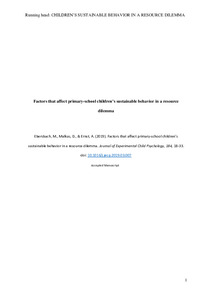| dcterms.abstract | Acting ecologically sustainably and not exhausting natural resources is becoming more and more important. Sustainable behavior can be investigated within the conceptual frame of resource dilemmas, in which users share a common, slowly regenerating resource. A conflict emerges between maximizing one’s own profit and maintaining the resource for all users. Although many studies have investigated adults’ behavior in resource dilemmas, barely anything is known about how children deal with such situations and which factors affect their behavior. Due to their still developing cognitive and social skills as well as their self-control, they might act differently than adults. In the current study, 114 children aged 6 to 11 years played a fishing conflict game. We manipulated (a) whether children played alone or in groups, (b) whether withdrawal was limited or not, and (c) whether children were allowed to communicate within the groups or not. In addition, children’s individual characteristics that were expected to be related to their sustainable behavior were assessed (i.e., delay of gratification, fairness concept, relatedness to nature, math grade, and age). Children’s success in maintaining the resource strongly depended on the game context. Similar to adults, children acted more ecologically sustainably when they played alone, when the withdrawal was limited, and when communication was allowed. In addition, older children acted more sustainably than younger children. The results are discussed in the light of findings with adults and with regard to potential interventions that aim at enhancing children’s sustainable behavior. | eng |


